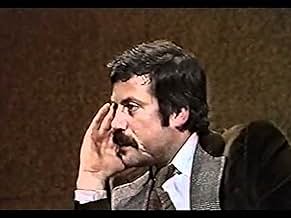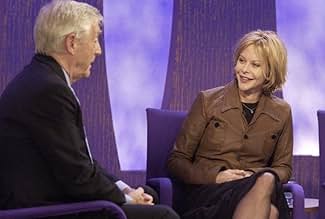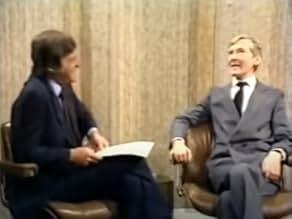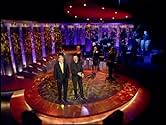Der Journalist Michael Parkinson interviewt ein breites Spektrum der berühmtesten Menschen der Welt.Der Journalist Michael Parkinson interviewt ein breites Spektrum der berühmtesten Menschen der Welt.Der Journalist Michael Parkinson interviewt ein breites Spektrum der berühmtesten Menschen der Welt.
- 1 BAFTA Award gewonnen
- 4 Gewinne & 8 Nominierungen insgesamt
Folgen durchsuchen
Empfohlene Bewertungen
Watched him since the 70's, always polite , draws guests out like no other, the only one Oprah would go on!he is the grand daddy of them all.His kind,gentle but probing manner puts his guests at there ease and in doing so they give more, the feeling is more of "old pals" chatting to each other than the stereotype chat show interview that seems to aim at "tripping up" the guest. Who could forget the interviews with Muhamid Ali and Helen Mirren to name but two.His abiding interest in sports journalism helps many interviews as his anicdotes role out, and his constant support of poor George Best over the years teaches so many of us what a "True" friend is really like.
I have just seen a 'Parky' show with the delightful Lesley Garrett. Apart from her marvelous voice, I was amazed at her vivacity and sense of humour. It was entertainment at it's best. Lesley was introduced as styling herself more like Gracie Fields than Maria Callas ... I'm sure she is truly loved for being herself.
If it wasn't for this type of show (and Parkinson show is the best of this genre) One would never see the other side of some of these celebrities, and we would be poorer for it.
It seems some people don't like the Parkinson show, these few people shouldn't watch it, especially when their jealousy for Parkinson's popularity shows so much.
If it wasn't for this type of show (and Parkinson show is the best of this genre) One would never see the other side of some of these celebrities, and we would be poorer for it.
It seems some people don't like the Parkinson show, these few people shouldn't watch it, especially when their jealousy for Parkinson's popularity shows so much.
The 1970s was the golden age of British television for so many reasons, not least because it was a time when television executives still assumed their viewers were intelligent enough to watch somebody sitting in a chair and speaking at length, without the need for regular interruptions and jokes from the interviewer. Michael Parkinson, unlike today's chat show hosts, was not a comedian, he was a journalist, and his talent was simply for researching his subjects and showing an interest in what they had to say. The remarkable thing about Parkinson was the variety of the guests. His abilities as an interviewer meant that he was able to successfully deal with guests as different as raconteurs (Kenneth Williams, Peter Ustinov), poets (John Betjeman), authors (Leslie Thomas), musicians (Duke Ellington) and scientists (Jacob Bronowski). Parkinson never dominated the show, he was quite happy to let the guests do that. As a result, he gave British television its greatest chat show, a standard that most subsequent chat shows didn't even bother to attempt.
In the 1970s the big stars rarely gave interviews, there were three television channels and no videos, DVDs or Internet. Parkinson had provided a rare opportunity to see these people. Clearly, things could not be the same when, in 1998, the BBC decided to resurrect the series, 16 years since it had ended. A great deal had changed in television over that period. As the 1990s progressed, the talk show increasingly became the domain of comedians as hosts: Jonathan Ross, Clive Anderson, Frank Skinner and Graham Norton. As such, chat shows became more lightweight and more about the host than the guest. Also, with the explosion of the media in the 1980s and 1990s, another effect was the decline in the meaning of celebrity. The revival of Parkinson lasted for nearly ten years but, unfortunately, the show was dying a slow death, with the man all too often having to interview celebrities so minor that you couldn't have made them up in the 1970s: Trinny & Susannah, Simon Cowell, Sharon Osbourne and Gordon Ramsay for examples. As hard as he tried, Parkinson could never convince me that he was as interested in these people as the great stars of the original series. I certainly wasn't.
In fairness, when he had a good guest he was still better than anyone else. One of his greatest abilities was to interview celebrities who are instinctively private and dislike the spotlight on themselves as subjects. He was better than anyone else at making these stars feel comfortable and able to talk, with Rowan Atkinson and Bobby Charlton being prime examples. I actually think that from what I have seen, only his contemporaries David Frost and Melvyn Bragg rival Parkinson in this regard.
Parkinson has now wrapped up his chat show. He has said himself that his show was the last survivor of the talk shows based on conversation. Now, all we have are the comedy shows based on the American format. In some ways it's a shame, in other ways it isn't. Most of the really fascinating stars are now dead or very, very old. Very few modern stars captivate the attention for very long, as Parkinson found in the last few years. Because even Parkinson couldn't make people interesting if they simply weren't.
In the 1970s the big stars rarely gave interviews, there were three television channels and no videos, DVDs or Internet. Parkinson had provided a rare opportunity to see these people. Clearly, things could not be the same when, in 1998, the BBC decided to resurrect the series, 16 years since it had ended. A great deal had changed in television over that period. As the 1990s progressed, the talk show increasingly became the domain of comedians as hosts: Jonathan Ross, Clive Anderson, Frank Skinner and Graham Norton. As such, chat shows became more lightweight and more about the host than the guest. Also, with the explosion of the media in the 1980s and 1990s, another effect was the decline in the meaning of celebrity. The revival of Parkinson lasted for nearly ten years but, unfortunately, the show was dying a slow death, with the man all too often having to interview celebrities so minor that you couldn't have made them up in the 1970s: Trinny & Susannah, Simon Cowell, Sharon Osbourne and Gordon Ramsay for examples. As hard as he tried, Parkinson could never convince me that he was as interested in these people as the great stars of the original series. I certainly wasn't.
In fairness, when he had a good guest he was still better than anyone else. One of his greatest abilities was to interview celebrities who are instinctively private and dislike the spotlight on themselves as subjects. He was better than anyone else at making these stars feel comfortable and able to talk, with Rowan Atkinson and Bobby Charlton being prime examples. I actually think that from what I have seen, only his contemporaries David Frost and Melvyn Bragg rival Parkinson in this regard.
Parkinson has now wrapped up his chat show. He has said himself that his show was the last survivor of the talk shows based on conversation. Now, all we have are the comedy shows based on the American format. In some ways it's a shame, in other ways it isn't. Most of the really fascinating stars are now dead or very, very old. Very few modern stars captivate the attention for very long, as Parkinson found in the last few years. Because even Parkinson couldn't make people interesting if they simply weren't.
ITV obviously bares a grudge against the BBC. The loss of the Premiership must still be fresh in the mind; why else would Parkinson air before Match Of The Day? As ruthless as it may sound, they're cunningly boring the audience to sleep.
Michael Parkinson has been peddling the same inoffensive, tired format for years now, and last nights episode was no exception. Guests included "the evergreen" Goldie Hawn, "the king of cool" John Travolta and, erm, "political correspondant" John Sergeant. 'Parky's golden rule is set out nice and clear from the outset: the bigger the star, the bigger the brown nosing.
He has neither the 'blokey' charm of Frank Skinner nor the wit of Jonathon Ross, but has somehow managed to remain increasingly popular throughout the years.
Unsurprisingly enough, Hawn was given an easy ride as far as questions go. Parkinson beamed on about her "glittering, successful career," clearly not having done his research. The fact remains that Hawn has not had a hit movie in nearly ten years. Her career is littered with far more misses than hits, but the way the he rambled on was like she'd won several Oscars. But she hasn't, and never will.
Next in the interviewee's chair was John Sergeant. Like Hawn, he too had a book to promote. This time though, it was about Margaret Thatcher. Sergeant claimed that with this book he "aimed to bring together the people who loved her and those who hated her." Parkinson agreed, but then again he would do. Hawn laughed uncontrollably at Sergeants mildly amusing political jokes, with one clear motive in her head: to make the audience believe that not all blondes are dumb.
John Travolta then took to the stage for his relentless barrage of lacklustre questioning. During his gruelling stint he was asked ridiculous questions such as "how do you manage to keep your feet on the ground?" This of course, was to a man, who, has two 747's parked in the driveway of his 60 acre mansion, and commands a $20 million fee for each film he's in. At one stage, Travolta told the story of the time he danced with Princess Diana - "I was told it was one of the highlights of her life" he beamed, "and one of mine too" he responded a good ten seconds later. At which point every middle aged housewife in Great Britain must of gone "Aw he's a lovely man." Parkinson then, for the first time in nearly 45 minutes asked a daring question - "Is their anytime in your career that you would point out as your lowest?" ("We've all had them," said Parkinson, obviously referring to the infamous Ali interview that occurred shortly after the invention of the wheel). Travolta though was allowed to skate around the question by referring to a time his car broke down.
And then it was back to sitting on the fence again for Parkinson, a position he's become rather too comfortable with throughout his career.
Michael Parkinson has been peddling the same inoffensive, tired format for years now, and last nights episode was no exception. Guests included "the evergreen" Goldie Hawn, "the king of cool" John Travolta and, erm, "political correspondant" John Sergeant. 'Parky's golden rule is set out nice and clear from the outset: the bigger the star, the bigger the brown nosing.
He has neither the 'blokey' charm of Frank Skinner nor the wit of Jonathon Ross, but has somehow managed to remain increasingly popular throughout the years.
Unsurprisingly enough, Hawn was given an easy ride as far as questions go. Parkinson beamed on about her "glittering, successful career," clearly not having done his research. The fact remains that Hawn has not had a hit movie in nearly ten years. Her career is littered with far more misses than hits, but the way the he rambled on was like she'd won several Oscars. But she hasn't, and never will.
Next in the interviewee's chair was John Sergeant. Like Hawn, he too had a book to promote. This time though, it was about Margaret Thatcher. Sergeant claimed that with this book he "aimed to bring together the people who loved her and those who hated her." Parkinson agreed, but then again he would do. Hawn laughed uncontrollably at Sergeants mildly amusing political jokes, with one clear motive in her head: to make the audience believe that not all blondes are dumb.
John Travolta then took to the stage for his relentless barrage of lacklustre questioning. During his gruelling stint he was asked ridiculous questions such as "how do you manage to keep your feet on the ground?" This of course, was to a man, who, has two 747's parked in the driveway of his 60 acre mansion, and commands a $20 million fee for each film he's in. At one stage, Travolta told the story of the time he danced with Princess Diana - "I was told it was one of the highlights of her life" he beamed, "and one of mine too" he responded a good ten seconds later. At which point every middle aged housewife in Great Britain must of gone "Aw he's a lovely man." Parkinson then, for the first time in nearly 45 minutes asked a daring question - "Is their anytime in your career that you would point out as your lowest?" ("We've all had them," said Parkinson, obviously referring to the infamous Ali interview that occurred shortly after the invention of the wheel). Travolta though was allowed to skate around the question by referring to a time his car broke down.
And then it was back to sitting on the fence again for Parkinson, a position he's become rather too comfortable with throughout his career.
I don't blame Meg Ryan for being upset with the lousy job the surgeon did on her mouth and the break up of her marriage, but it's not the British audience's fault. If she is anything of an actress she could at least have acted as if she was gracious and intelligent.
She came across as a wannabee intellectual snob without an intellect to be snobbish about.
She came across as a wannabee intellectual snob without an intellect to be snobbish about.
Wusstest du schon
- WissenswertesThe first series of the show, including interviews with John Lennon, Yoko Ono, Peter Ustinov, Benny Goodman, Spike Milligan and Orson Welles, was wiped on the orders of a BBC committee. All that survives of the first series is a monochrome telerecording of his interview with Shirley MacLaine.
- VerbindungenEdited into Heroes of Comedy: Terry-Thomas (1995)
Top-Auswahl
Melde dich zum Bewerten an und greife auf die Watchlist für personalisierte Empfehlungen zu.
- How many seasons does Parkinson have?Powered by Alexa
Details
- Erscheinungsdatum
- Herkunftsland
- Sprache
- Auch bekannt als
- Паркинсон
- Drehorte
- Produktionsfirmen
- Weitere beteiligte Unternehmen bei IMDbPro anzeigen
Zu dieser Seite beitragen
Bearbeitung vorschlagen oder fehlenden Inhalt hinzufügen



































